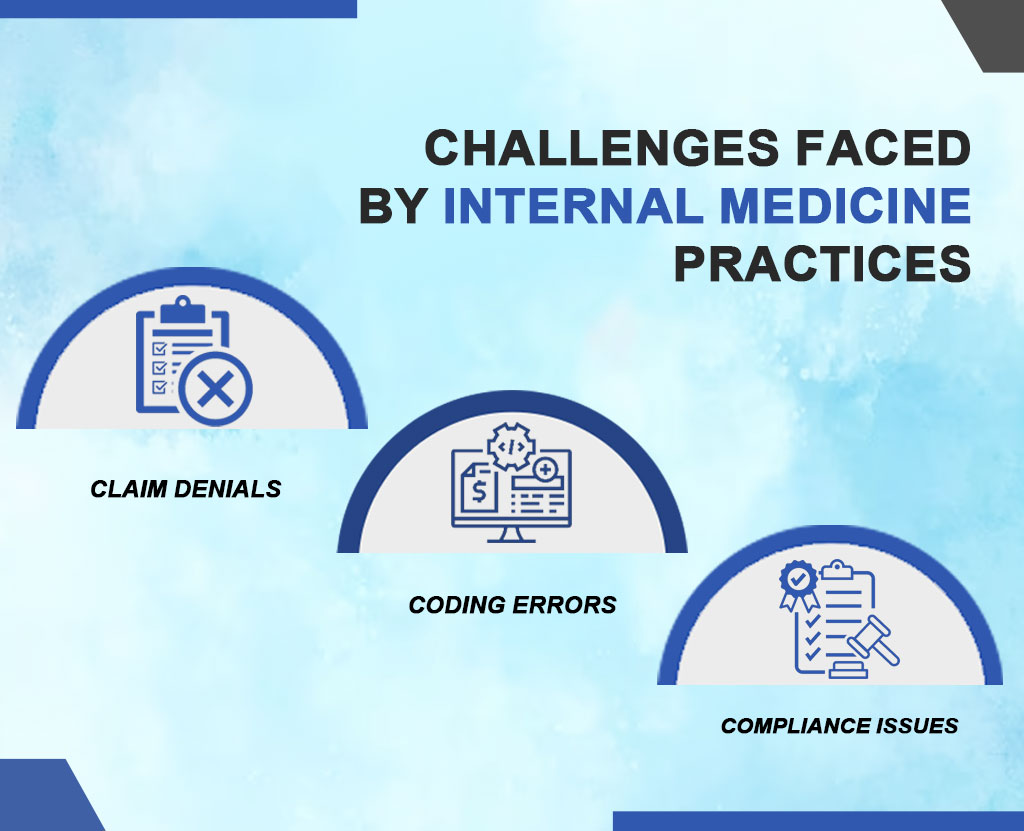Internal medicine billing and coding are central to ensuring that internal medicine practices are paid. Health insurance organizations utilize codes to process claims for complicated medical conditions and treatment.
Internal medicine billing and coding track and code services provided to patients properly to avoid claim denials, ensure that their medical practice is financially sound, and provide clear billing to patients.
It is a broad field encompassing general outpatient care, including managing chronic diseases, preventative care, and emergency care. This is because the coding and billing of these services are complicated. Internal medicine billing and coding require knowledge of medical terms, ICD-10, CPT, HCPCS, and medical billing.
What Exactly is Internal Medicine Billing and Coding
Internal medicine medical billing includes sending in insurance reports and following up on them to ensure they get paid. To start billing, healthcare workers write down the patient’s diagnosis and treatment when they see them. Using defined codes, these facts are used to make claims.
Billing for internal medicine includes ensuring patients’ insurance is real, correctly coding their diagnosis and treatment, sending claims to insurance companies, and following up on claims that haven’t been paid or were denied. If you don’t understand how to bill for internal medicine, claims could be denied, payments could be delayed, and the business could lose money.
Common CPT Codes for Internal Medicine
Healthcare providers use CPT codes to record and send information about medical, surgical, and diagnostic treatments. These codes are used in internal medicine to accurately describe how doctors deal with patients, how procedures work, and how tests are done. Because CPT codes directly affect bills, it is important to use them correctly so that insurance companies pay for treatments. Internal medicine doctors must know CPT numbers to run their practices well and make money
Top Common CPT Codes Used in Internal Medicine
- 99213 – Established Patient Office Visit
- 93000 – Electrocardiogram (ECG) with Interpretation and Report
- 36415 – Venipuncture
- 99214 – Established Patient Office Visit
- 90471 – Immunization Administration (Single Vaccine)
How These Codes Impact Billing and Reimbursements
Correct CPT coding affects billing and getting paid back. Coding mistakes can lead to lower reimbursements, late payments, or cases being denied. Understanding and using standard CPT codes helps internal medicine practices stay financially stable by ensuring that all services are fully reimbursed. Accurate CPT coding is also necessary for federal compliance and audit prevention.
Common ICD-10 Codes for Internal Medicine
All hospital diagnoses, symptoms, and operations are coded using alphanumeric ICD-10 codes. Internal medicine relies on ICD-10 codes to document diagnoses and justify treatments. These codes help preserve correct patient records, ensure continuity of care, and meet insurance claim approval standards.
Frequently Used ICD-10 Codes in Internal Medicine
- I 10 – Primary or Essential Hypertension
- E11. 9 – Type 2 Diabetes mellitus with no complication
- J06. 9 – Other Accidental transfers / Acute upper respiratory tract infection, unspecified
- E78. 5 – Hyperlipidemia, Unspecified
- R73. 03 – Prediabetes
Challenges Faced by Internal Medicine Practices
Internal medicine billing and coding present unique challenges due to the broad spectrum of services offered. Common issues include:

1. Claim Denials
Some issues commonly affecting most providers include an unacceptably high claims denial rate. Some or most internal medicine practices treat more complicated illnesses, often requiring several diagnosis procedures. Lack of documentation, errors in patient data, and coding mistakes can result in denials that hurt the health facilities’ cash inflows.
2. Coding Errors
The other intractable problem highlighted is the biggest challenge of coding in internal medicine. Due to the likelihood of coding for multiple diseases and treatments, coding errors are frequently made. Improper or old codes bring consequences such as underpayment, overpayment, or rejection of claims that lead to a revenue cycle disruption.
3. Compliance Issues
Tips for Overcoming Internal Medicine Billing and Coding Challenges
There are a few things that internal medicine offices can do to deal with these problems:
Regular Training and Education: It is important to ensure that the medical billing and coding staff receives the latest codes and is in state and federal compliance. By holding learning sessions consistently, it’s possible to reduce mistakes and ensure the team knows the latest rules and requirements.
Utilize Advanced Billing Software: Some ways to solve the problem of inaccurate or delayed billing may include acquiring modern forms of billing software. Software that offers coding changes and compliance rules update features can be quite useful.
Thorough Documentation: Add accurate recording and documentation of patients’ details and their history to the list of essential activities. Clear and detailed documents will help code and avoid claim denials properly. This policy should encourage all the personnel who have come into contact with a particular patient to document.
Outsource Billing Services: In most practices, billing and coding may be done by outsourcing to an external company that specializes in the field. Outsourcing billing services to professionals in the field can help deal with such cases, maintain legal standards, and increase revenue by minimizing possible denials and mistakes.
Wrapping-Up!
Internal medicine practices must ensure they have correct internal medicine billing and coding to avoid losing money and having compliance problems. Practices can resolve many common problems by staying current on laws, buying the right tools, and keeping detailed records.
If internal medicine billing and coding are hard for you, you might want to look into professional billing services. These experts can speed up the income cycle, eliminate mistakes, and meet new standards. Instead, teach and prepare your team to do a better billing job. Using the correct billing and coding is like putting money into the future of your business. Contact Resilient MBS immediately to improve your internal medicine billing and coding payment process and ensure it is accurate and follows the rules.









